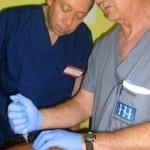Hormone Replacement Therapy (HRT) Warning – Benefits, Risks and Options
A new study on hormone replacement published in the Annals of Internal Medicine and reported in The Washington Post, entitled “Study Issues Hormone-Therapy Warning” (5/29/2012) has sounded –again—the perennial alarm on hormone replacement therapy. The controversial U.S. Preventative Task Force determined that hormone replacement in postmenopausal women showed an increased risk of heart disease, stroke, blood clots, and breast cancer in women taking Premarin and Provera.
There is a limited benefit in decreased bone fracture risk in women taking Premarin (made from pregnant mare’s urine) and Provera (a progestin, a progesterone analogue which has been modified to fit on a progesterone receptor). The estrogen-only part of the study showed a decrease in breast cancer risk. This study based its findings on revised analyses of the Women’s Health Initiative (WHI)—a 15-year study of over 160,000 women.
On the same day, in The Washington Post’s Health section, there was an article citing the July 2011 issue of Climacteric, the journal of the International Menopause Society. In more than a dozen articles focusing on hormone replacement therapy‘s relationship to breast cancer, cardiovascular disease, dementia, and other conditions, the authors conclude that for younger women using hormone therapy close to the time of menopause, benefits generally outweigh the risks.
A summary of the journals’ findings is as follows:
* Women whose breast cancer risk is low and who suffer from menopausal symptoms like hot flashes, sleep disturbance, and vaginal dryness can benefit from hormone replacement
* Hormone therapy reduces the risk of colorectal cancer and bone fractures
* Hormone therapy can increase the risk of dementia in older women and there is also a small increased risk of stroke
* Oral estrogen (as opposed to transdermal gel and patches) increases the risk of blood clots
How can we interpret all this information?
It’s important to understand the limitations of the WHI’s study. Examining the effects of synthetic estrogen such as Premarin and synthetic progestin such as Provera doesn’t tell the whole story. For example, these hormones have many metabolites. As these are processed through the liver, they produce an increase in inflammatory markers contributing to the risk of blood clots. The WHI “estrogen only” arm of the study interestingly showed a decreased risk of breast cancer, meaning the progestin they were using was the problem. Also, the age range in the WHI study was 50-79, yet when stratified to ages 50-59, risks of everything dropped dramatically.
Are there risks of hormone therapy?
Hormone therapy continues to be an option for many women who wish to reduce the side effects of menopause –including hot flashes, night sweats, and vaginal dryness. But, the answer is yes, there are risks, especially if one has a strong family history of breast cancer, genetic susceptibility to blood clots such as Factor 5 Leiden, and if one has insulin resistance or heart disease.
Are there safer choices?
There are safer choices, such as using more natural hormones (“bio-identical hormones”) like estradiol, estriol transdermal (through the skin), and micronized progesterone. Diets high in indole 3C, contained in cruciferous vegetables (broccoli, cauliflower, Brussel sprouts), supplements like green tea extract, folic acid, fish oil, and flaxseed all decrease risk of breast cancer and heart disease. Daily exercise, good sleep, and healthy digestion also play an important role in breast cancer and heart disease risk reduction.





Leave a Reply
Want to join the discussion?Feel free to contribute!